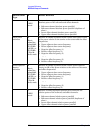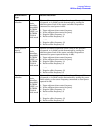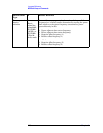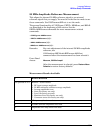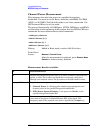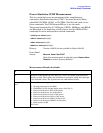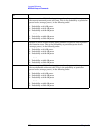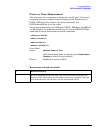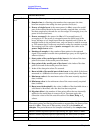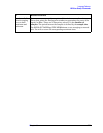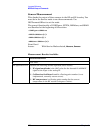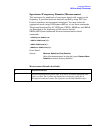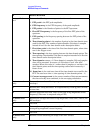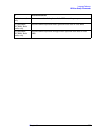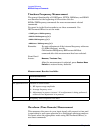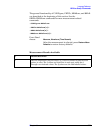
272 Chapter 5
Language Reference
MEASure Group of Commands
not specified or
n=1
Returns the following comma-separated scalar results:
1. Sample time is a floating point number that represents the time
between samples when using the trace queries (n=0,2,etc.).
2. Power of single burst is the mean power (in dBm) across the useful
part of the selected burst in the most recently acquired data, or in the
last data acquired at the end of a set of averages. If averaging is on, the
power is for the last burst.
3. Power averaged is the power (in dBm) of N averaged bursts, if
averaging is on. The power is averaged across the useful part of the
burst. Average m is a single burst from the acquired trace. If there are
multiple bursts in the acquired trace, only one burst is used for average
m. This means that N traces are acquired to make the complete average.
If averaging is off, the value of power averaged is the same as the
power single burst value.
4. Number of samples is the number of data points in the captured
signal. This number is useful when performing a query on the signal (i.e.
when n=0,2,etc.).
5. Start point of the useful part of the burst is the index of the data
point at the start of the useful part of the burst.
6. Stop point of the useful part of the burst is the index of the data
point at the end of the useful part of the burst.
7. Index of the data point where T
0
occurred.
8. Burst width of the useful part of the burst is the width of the burst
measured at
−3dB below the mean power in the useful part of the burst.
9. Maximum value is the maximum value of the most recently acquired
data (in dBm).
10.Minimum value is the minimum value of the most recently acquired
data (in dBm).
11.Burst search threshold is the value (in dBm) of the threshold where a
valid burst is identified, after the data has been acquired.
12.IQ point delta is the number of data points offset that are internally
applied to the useful data in traces n=2,3,4. You must apply this
correction value to find the actual location of the Start, Stop, or T
0
values.
2 Returns comma-separated trace points of the entire captured I/Q trace data.
These data points are floating point numbers representing the power of the
signal (in dBm). There are N data points, where N is the number of
samples. The period between the samples is defined by the sample time.
3 Returns comma-separated points representing the upper mask (in dBm).
4 Returns comma-separated points representing the lower mask (in dBm).
7 Returns power level values for the 8 slots in the current frame (in dBm).
n Results Returned



